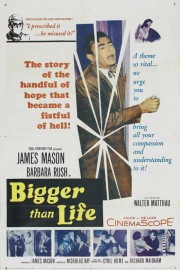Bigger Than Life
Nicholas Ray’s “Bigger Than Life” is melodrama, but it’s powerful melodrama, as a husband and father descends into madness when prescribed an experimental drug to treat a life-threatening illness. The film was not a hit at the time, but 60 years later, it’s hard not to recognize the powerful social commentary Ray and his writers, Cyril Hume and Richard Maibaum, bring to the story inspired by a New Yorker article by Burton Roueche. As someone who struggles with anxiety and emotional issues, and has often struggled with societal views on masculinity and gender roles, “Bigger Than Life” resonates on a personal level, although I haven’t been pushed quite as far in my life as James Mason’s character is here.
The primary reason I am aware of “Bigger Than Life” comes from the four-hour documentary, “A Personal Journey With Martin Scorsese Through American Movies,” where he discussed it in the context of ’50s films that broke from cinematic norms to take on difficult subjects head on, or sometimes simply under the surface. The clips he used in that documentary were from the 2nd half of the film, but that does nothing to dull the film’s punch. Throughout, Mason’s Ed Avery, a school teacher, is an example of an antihero who is taken through Hell by circumstance. He seems to have a cozy life with his wife, Lou (Barbara Rush), and their son, Richie (Christopher Olsen), but we start to see the cracks in that facade early on when he calls his wife to let him know he’ll be late due to teacher meetings, but in fact, it’s because he has a side job as a taxi dispatcher. Immediately, we understand one of the things Ray is delving into in his film, and recognize it as a very current issue, even if the film is 60 years old; a man forced to work two jobs to make ends meet. His wife is worried he’s having an affair, but when the truth comes out, she is concerned for other reasons, ones that we understand all too well at a time when people are just clawing to get by sometimes. One day, Ed lands in the hospital with a rare, life-threatening illness. The only way the doctors know to treat it is through an experimental drug, Cortisone, but while Ed’s outlook and physical health gets better overnight, so do mood swings, and suddenly, he is behaving quite erratically. The change is almost instantaneous for Lou and his boss, played by Walter Matthau, and only grows stronger and more dangerous as he begins to really abuse the drug.
It’s hard to imagine this film as anything other than a movie-of-the-week on TV now, but Ray (“In a Lonely Place,” “Rebel Without a Cause”) is too extraordinarily gifted a storyteller of a fractured male psyche to fall completely into cliche. A big part of the film’s effect is the way he uses the recently-developed Cinemascope format to make the psychological pressures on Mason’s character feel palpable. Yes, some of his devices are obvious, but they are effective when paired with Mason’s tremendous performance as Avery. This is very much a comparable role to his later one in Kubrick’s “Lolita,” and seeing it in its entirety after years of only the clips in Scorsese’s documentary, it’s a powerful, multi-layered role that the actor plays with sincerity and exceptional skill. He is well complimented by Rush as his wife and Olsen as his son, whose anxieties about how his attitude changes are noticeable on their faces. This is the nuclear family about to explode, and it’s the little bursts that signal the big bang that lead to the film’s painful conclusion, something Ray was one of the best at getting to.










